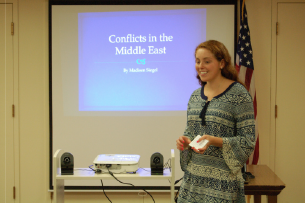This summer, Madisen Siegel ’17 used a grant from DA to educate herself and those in her community on the past and present history of the Middle East. Her interest in learning about the Middle East stems from her family’s Jewish heritage and from the fact that her grandfather lives there. She stated that before learning more about the region, she felt “very ignorant,” and explained that that her “main inspiration for the project was to prevent the ignorance that sparks so many stereotypes about the region and subsequent conflicts.”
Siegel began her project by taking an intensive three-week course at Princeton University called Politics in the Middle East. “What was really cool about [the class] was that it took an objective, academic stance on all of the issues…we weren’t learning biased views from either side.” She explained that hearing from news sources is not a sufficient way to understand everything that is going on, stating, “You have to look into history to get the truth.”
Siegel used all of the knowledge she learned from the class at Princeton to create a PowerPoint presentation that she delivered to two audiences in her hometown in New Jersey—one at the Glenn Rock Public Library and the other at the Glenn Courts Senior Independent Living Center. One of the events was advertised in the Glenn Rock Gazette, her town’s local newspaper.
She centered her presentation on the following mantra: “To Understand We Must Contextualize.” Her PowerPoint offered this contextualization by presenting a detailed history of the Middle East that she hoped would provide an unbiased portrait to her audience.
The presentation began by detailing the general region and land. Siegel explained that the area is “a melting pot of leftover countries.” Next, she discussed negative stereotypes in the Middle East, especially concerning Islam, because there are “a lot of misconceptions about the religion.” The presentation included details about fundamentalism in Islam because that term is often associated with ISIS and other terrorist groups; however, as she clarified, fundamentalism itself does not relate to terrorism at all.
During her presentation she also discussed the Israeli-Palestinian Conflict. She wanted to explain that the tension and violence between Israel and Palestine has been “building and erupting” for a while. She said she discovered the roots of the cause of the conflict by “looking back into history.”
Siegel recounted that her audience was “overwhelmed after discovering how much they didn’t know about the region and the history,” especially after they discussed the Israeli-Palestinian conflict and the Iran Nuclear Deal. She explained, “Their reactions reminded me of my own response when I had been first exposed to the material just a few weeks earlier.”
Siegel wanted to show the audiences that there are not “sides to each conflict” in the Middle East, but rather that “it’s all just shades of gray.” She continued, “The only way to understand now is to look back and understand the relationships that were formed” and the tensions that emerged in those relationships. She explained that she wanted to be sure to be completely objective in her presentation because she knew that she would be speaking to people of Jewish faith and perhaps people who had lived during the Holocaust.
Siegel explained of her final project, “Not only was I able to master the material better by teaching it, but also it was fulfilling to see my community’s reactions.”
If you are interested in hearing Siegel’s presentation, The Center for Service and Global Citizenship plans to host a service symposium in the Boyden Library once renovations are complete. Siegel and other students who utilized summer service grants will have the opportunity to present their projects. In addition, Siegel is willing to give the presentation again on campus for those who are interested.

